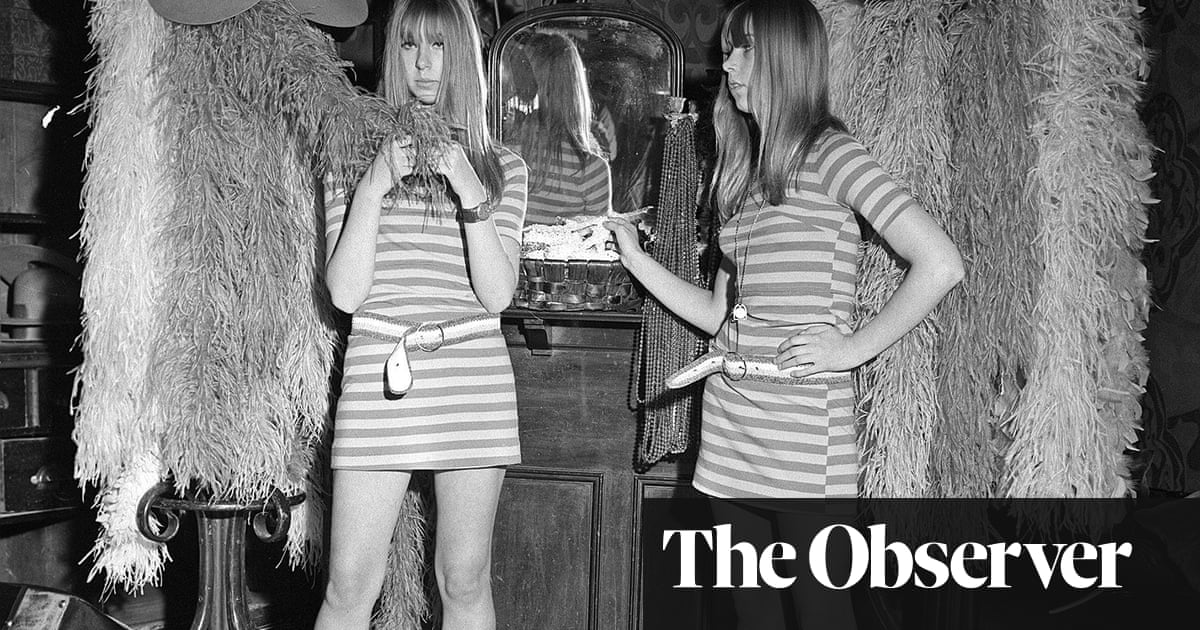
Reports of the death of the stereotypical West End producer have been exaggerated. I’m in Bath, sitting in the sun with impresario David Pugh, who is smoking fags, swilling vodka and coke, and whispering indiscreet showbiz gossip into my shell-like. What a lunchtime! With his pledges of allegiance to mid-20th-century entertainment values (“I want to be Ken Dodd”), 62-year-old Pugh could seem like a throwback. But he’s also a progressive, a rare example of the commercial producer with a commitment to new work from unexpected sources.
“I like exciting theatre,” he says, “and a lot of producers don’t do exciting theatre. They do safe. But there’s only so many times you can do Relatively Speaking with Penelope Keith.” This is promptly followed by an “ooh, aren’t I awful” apology for taking Ms Keith’s name in vain. If I didn’t know Pugh to be an old-school comedy fan, I could tell by his vaudevillian, faintly camp speech patterns. Only faintly camp, mind you. When I remind Pugh that he was once played onstage by Toby Jones, in his smash-hit Morecambe and Wise tribute show The Play What I Wrote (“I’m David Pugh!,” Jones would announce, entering the stage as if with a flourish of a cape), the producer wrinkles his nose. “A bit too camp, I thought. My mum wasn’t happy.”
She usually was, mind you. “My guiding principle was always: will mum like it?,” says this son of Stoke-on-Trent. “Which is why I’ve worked with Nigel Havers a lot.” Havers was one of the (many) stars of that ur-Pugh production Art by Yazmina Reza, which he brought to the West End with Albert Finney and Tom Courtenay, bankrolled by Sean Connery, back in 1996. Alongside that never-ending, endlessly renewing show (of which he is now scheming a Broadway revival), Pugh’s signature hits include a Tony award-winning Equus with Daniel Radcliffe and Kneehigh’s globetrotting adaptation of Brief Encounter.
It’s with shows like the latter that his heart lies. “I loved working with The Right Size (who made The Play What I Wrote), with Kneehigh and now with Told By An Idiot.” The latter company - one of the jewels of left-field British theatre these last two decades – is why Pugh and I are in Bath today. Their Strange Tale of Charlie Chaplin and Stan Laurel, a seafaring fantasia imagining the Atlantic crossing of two silent movie icons 110 years ago, made waves on its 2020 premiere. Pugh read the Guardian’s review, he tells me – ever the charmer – and rushed to see it. He is now its producer, reviving it under a new title, Charlie and Stan, for a UK tour.
It’s a gig that (give or take a global pandemic) propels Pugh back into his comfort zone. “I feel like I’m 18 again,” he says, vodka in hand. “I feel like I’m at the Edinburgh Fringe, putting up posters. I’ve got my enthusiasm back, which I think might have waned.” It waned, he says, because – after decades making commercial theatre – “I got to the point where I could raise £3m, so I thought: I’ll do a musical. And then I realised I’m not very good at producing musicals.” The Girls, Tim Firth and Gary Barlow’s adaptation of Calendar Girls, and Take That jukebox musical The Band were both critical successes. But “it’s not the same”, says a wistful Pugh.
“The difference is, on Saturday night at the first preview of Charlie and Stan, we can watch the show and think, ‘we need to change that’. And those changes will be in the show by the next day. But if you want to make changes to a musical, it’s like being the captain of a ship: you have to go another five miles before you can turn round. There are so many people and so much expense involved.”
Far better to be back in the seat-of-your-pants world of comic theatre, where Pugh’s end-of-the-pier know-how can be deployed to immediate positive effect. With his input, the role of Stan Laurel (played by Jerone Marsh-Reid) has been substantially developed, which might offset the loss of Amalia Vitale, whose turn as Chaplin lit up the show’s first run. (“But the new girl [Danielle Bird] is fantastic too …”) The show conjures a series of scenes, more or less true, and almost all slapstick, as Charlie and his underling Stan cross the ocean as part of cigar-chewing Fred Karno’s music hall troupe. We flash back to Chaplin’s Dickensian childhood and forward to the death of Oliver Hardy via not-wholly-verifiable episodes such as Charlie’s impromptu killing of Stan at sea with an outsized frying pan.
But will anyone come and see it? Like everyone in theatre, Pugh has struggled to stay afloat these last 18 months. His total 2020 income, he tells me, was the £10,460 he made staging Educating Rita at the outdoor Minack theatre in Cornwall – “and I gave it all to my investors, just to make sure they were still there when I needed them”. Pugh refers frequently to his “188 investors”, and fondly too – the more so since his production of Emma Rice’s Malory Towers was pulled when Covid struck. “My investors took a bath,” he says – meaning they lost all their money. “I’d spent £400,000 by the time we got to tech [rehearsal]. And it was a write-off.”
So with Charlie and Stan, he says, “I’ve financed this myself. Which you’re not supposed to do, and I’ve never done.” And he’s worried, because “we can’t get people in. It’s not the show’s fault: there’s nobody coming to other productions either. Audiences still aren’t sure.”
That’s why, like his 18-year-old self, Pugh is out flyering, struggling even to give tickets away. “It’s going to take much longer [to recover from Covid closure] than people think. People are confused, and tired of the contradictions. My dad always told me: ‘have a backup’. I said to him on the phone last week, ‘you didn’t tell me I’d need 17 backups!’ We’re tired of the lack of leadership. We all work on the basis of ‘the show must go on’, but bloody hell, that’s being tested at the moment!”
There are other tests. In the run-up to Charlie and Stan, several of its posters around Bath were defaced with racist abuse. Marsh-Reid, who plays Stan Laurel, is mixed-race. “Two people,” says Pugh, “rang up demanding their money back. It’s shocking.” It really is. That behaviour would never be acceptable, but feels even less so given the clownlike innocence of the show. Director Paul Hunter, Pugh says, “didn’t set out to [cast a black Stan Laurel]. He set out to cast the best people.” Some of Pugh’s assuredness departs him when pronouncing on these matters, but there’s no doubting his sincerity when he says “the whole thing about diversity is, we can’t just keep saying it. We need to open the doors.
“I trained to be a drama teacher, because my mum and dad told me I had to have something to fall back on. I used to be a producer three days a week, and a Hackney supply teacher four days a week.” He talks about his multi-ethnic classrooms back then, taking them to see Antony Sher at the RSC and revelling in the culture clash. “It’s about the youth, and youth theatres,” he says. “I have a big problem with drama schools and the fees they take. That’s restrictive. We need more and better youth theatres: I can’t champion them enough.”
He puts his money where his mouth is, too – at least in terms of accessibility more widely. Pugh has a long-standing grouch against exorbitant ticket pricing, and refuses to engage in it.
“I once got given notice on my office at Wyndham’s theatre,” he says, leaning in, “because I criticised premium seats” – by which he means “best seats in the house” sold at sky-high prices. “Cameron Mackintosh was my landlord, and I did an interview where I said ‘premium seats are greed’. By coincidence, it was the day before Hamilton went on sale. And I got given notice that they needed my office back. Which, again”, he twinkles, “must be coincidence.”
Pugh is short of an office again today, his Sloane Square premises having been damaged in this month’s flash floods. Add that to the rest of his troubles, and you’d forgive this 62-year-old for putting his producing days behind him. But that’s far from his mind. Instead, he’s courting indie performance darlings Sh!t Theatre, he tells me, whose satirical and hugely entertaining work he loves. He’s also soon to announce a West End run of the karaoke-meets-Jane Austen Scottish hit Pride and Prejudice* (*sort of). “It’s witty and it’s funny,” he says, “and it’s right up my alley.”
“Of course,” he says, “I still have to do all this, because I don’t have any other income. I can’t take money out of a mortgage – although I’ve got a really tiny, beautiful Soho flat that I rent. But I set things up like that so that I’d always have the drive. And I do. I’ve been doing this for 40 years, which is an achievement in itself. The bigger achievement is that I still want to do it. And the pandemic has made me want to do it even more.”
Charlie and Stan is at the Minack Theatre, Cornwall until 12 August, then touring.












